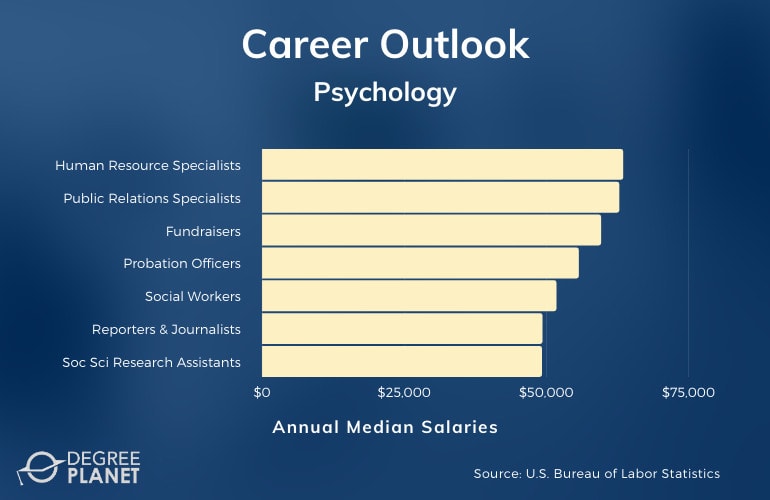If you’re fascinated by human behavior and want to make a difference for others, you may ask, “Is psychology a good major?”

Majoring in psychology can be a beneficial option for learning more about the ways that people think and act. A psychology degree program can provide insights with the potential to benefit many different sectors.
Editorial Listing ShortCode:
If you choose to study psychology, you might end up pursuing work in counseling, business, education, criminal justice, or a countless number of other fields.
Is Psychology a Good Major?

Yes, psychology is a good major for many undergraduate students. The Bureau of Labor Statistics is projecting 5% job growth in life, physical, and social science occupations over the next 10 years.
You might choose a psychology major as a stepping stone toward a career as a professional psychologist. The Bureau of Labor Statistics states that psychologists earn a median annual salary of $82,180. Most make between $46,270 and $137,590 each year.
Becoming a licensed psychologist requires a graduate degree, but there are other career options that a bachelor’s in psychology can help prepare you for. Psychology degrees can often act as a path toward job versatility.
Editorial Listing ShortCode:
Taking courses like human cognition and social psychology during your college program can help provide a framework for understanding how people think and operate. By building on that knowledge, graduates have found success in fields like human resources, journalism, public relations, education, counseling, and research.
Human resources could be a particularly well-paying career track to pursue. HR specialists earn a median salary of $63,490 per year, and HR managers average $121,220 annually.
If an in-demand line of work is a priority for you, then you may consider the career path of a mental health, behavioral disorder, and substance abuse counselor. According to the Bureau of Labor Statistics, jobs for this position are growing at a 25% rate.
Psychology Major Curriculum

In addition to the general education requirements that are common to all college students, psychology majors take core classes that aim to increase their knowledge about how people think, learn, grow, and behave.
The courses that you might take in a college psychology program could include:
- Biology and Behavior
- Cultural Diversity
- Ethics for Professional Psychology
- Foundations of Psychology
- History of Psychology
- Human Growth and Development
- Learning and Memory
- Personality Theories
- Psychology Research and Statistics
- Social Psychology
You may be able to sign up for a concentration to prepare you for a particular career track. Common concentrations include addictions, child development, and criminal justice psychology.
Top 5 Things You Can Do with a Psychology Degree

A psychology degree can help prepare you to go directly into the workforce, or it can serve as the first step along your educational path. To help you figure out which approach might be the right one for you, here are some of the top jobs for psychology majors.
1. Psychologist
A psychologist is an expert in human thought and behavior. To earn this title, you’ll need to hold a graduate degree in psychology.
Psychologists can counsel individuals, conduct research, and provide expert insight in various settings. Specialties for psychologists include forensic, industrial-organizational, clinical, counseling, and school psychology.
2. Mental Health Counselor

Many people could use guidance and support to navigate stressful situations, cope with mental health challenges, overcome past trauma, or recover from addictions. As a mental health counselor, you could provide that support.
A bachelors can be sufficient for some entry-level roles, but a graduate education can lead to state licensure and increased responsibilities.
3. Human Resources Specialist

Human resources professionals play a key role in managing and developing an organization’s human capital.
In a company’s HR department, you could put your psychology skills into practice as you contribute to matters of hiring, employee development, conflict resolution, or compensation. With experience, you may even advance to management roles within the HR department.
4. Public Relations Representative
Public relations professionals develop and maintain an organization’s image. Your understanding of human psychology can be useful as you prepare messages that bolster your company’s reputation, create brand loyalty, and smooth over problems.
Editorial Listing ShortCode:
In the PR field, new graduates sometimes begin as specialists and may eventually have opportunities for management positions.
5. Correctional Treatment Specialist
Correctional counselors provide rehabilitation services for people who are on parole or probation. Maintaining records about each person on their caseload is an important part of the job.
Their responsibilities can include running psychological tests, helping with job or housing placement, and keeping in touch with other professionals involved in the criminal justice system.
Psychology Careers

A major in psychology provides keen insight into human thought, behavior, relationships, and attitudes. That knowledge can help build a solid foundation for all sorts of careers, particularly those that involve working with people.
In the business world, that could mean a job in human resources, fundraising, or public relations. If you’re interested in education, you may consider an early childhood or childcare role.
Your ability to understand people and their needs and desires may also contribute to the field of journalism. There may be technical roles for you in the social science field as well. You might be able to work as an assistant to a psychiatrist or join a psychology research team.
According to the Bureau of Labor Statistics, life, physical, and social science occupations pay a median annual salary of $69,760.
| Careers | Annual Median Salaries |
| Human Resources Specialists | $63,490 |
| Public Relations Specialists | $62,810 |
| Fundraisers | $59,610 |
| Probation Officers and Correctional Treatment Specialists | $55,690 |
| Social Workers | $51,760 |
| News Analysts, Reporters and Journalists | $49,300 |
| Social Science Research Assistants | $49,210 |
| Preschool and Childcare Center Directors | $49,160 |
| Substance Abuse, Behavioral Disorder, and Mental Health Counselors | $47,660 |
| Psychiatric Technicians | $35,030 |
These salaries represent national averages and aren’t a guarantee of employment outcomes or earnings. Your job opportunities can vary based on your experience, training, and geographic region. Some positions may require additional education or certification.
You may be interested in psychology because of a desire to help people in need. To that end, you might want to pursue a job in mental health counseling, social work, correctional counseling, or substance abuse counseling.
Editorial Listing ShortCode:
Entry-level opportunities for those with a bachelor’s degree can vary from state to state, and licensure or certification may be required.
In fact, further education and licensure can open the door to a variety of other career paths, such as being a marriage and family therapist, a school and career counselor, or a psychologist. A bachelor’s degree in psychology can be a strategic first step.
How to Know If a Degree in Psychology Is Right for You

Psychology is often listed as a popular college major, so it might catch your eye as an academic track worth considering. Of course, just because a major is popular doesn’t mean that it’s the best choice for you. The following clues might help you decide whether this degree is a good fit.
You might want to be a psychology major if you:
- Are interested in the reasons for people’s behavior
- Can spend countless hours reading about the history of psychology
- Don’t mind the idea of furthering your career through graduate studies
- Hope to work with people, whether one on one or in organizational settings
- Want to focus your professional life on helping people
Even if this list doesn’t precisely sum you up, you may still succeed in a psychology program. Talking to a college admissions counselor can provide valuable insights about whether you should major in psychology.
Is Psychology a Hard Major?

There’s a lot of reading involved in a psychology program. In classes that are an introduction to psychology and personality theory, you’ll hit the books to learn about the history of psychology, mental health disorders, psychological theories, and human development.
Psychology programs often emphasize research as well. Learning to gather data, run tests, analyze statistics, and think like a psychologist may be critical components of your college studies.
You’ll take foundational classes, like ones that cover methods for psychology research, and then you’ll be expected to understand and use those principles in later classes.
Is a Psychology Degree Useless?

If you’re committed to gaining a better understanding of the general human experience and are willing to explore the vast range of opportunities offered by psychology studies, then you might find this degree quite useful.
There are quite a few jobs you can do with a bachelor’s degree in psychology. Some psychology graduates apply their knowledge of personality, cognition, and group dynamics in human resources departments or preschool classrooms. Others pursue certifications or graduate degrees to become social workers, mental health counselors, or school psychologists.
What Can You Do with a Psychology Degree?

Jobs for psychology graduates sometimes include working in fundraising, human resources, teaching, or journalism.
Some psychology graduates are able to do entry-level counseling work. According to the Bureau of Labor Statistics, mental health and substance abuse counselors are often employed by outpatient centers, residential facilities, hospitals, and government agencies.
Editorial Listing ShortCode:
A psychology bachelor’s degree can help prepare you for graduate-level work in psychology. Potential jobs for those with a license and a masters or doctorate include psychologist, licensed clinical social worker, and marriage and family therapist.
The Bureau of Labor Statistics shows that psychologists generally are self-employed or work for schools, hospitals, or the government.
Is a Psychology Degree Worth It?

Yes, a psychology degree is worth it for many students. A psychology program can help develop your understanding of human behavior and enhance your research and communication skills.
You might find that those skills are applicable in many different industries, not just those directly related to psychology. Whether you’re interested in business, education, or media, you may be able to put your psychology degree to good use.
Psychology graduates can also pursue work in counseling-related fields. According to the Bureau of Labor Statistics, life, physical, and social science work is increasing at a 5% rate. Mental health counseling jobs in particular are growing at a 25% rate.
Getting Your Degree in Psychology Online

Psychology is a fascinating field that can play a role in business, communication, criminal justice, and daily life. Of course, the principles of psychology also serve as the basis for mental health counseling, family therapy, and psychological treatment.
You can choose to pursue a counseling career or apply your psychology knowledge to another line of work. Either way, a psychology major can help provide a solid foundation for your professional ambitions.
You can earn this type of bachelor’s degree through online study at an accredited university. Online courses provide a flexible approach to learning about human development, cognition, personality theories, and professional ethics.
You may want to note that a growing number of universities offer accelerated psychology degrees online, which may get you through your bachelors degree faster. You can explore the various accredited online psychology programs to get started.

